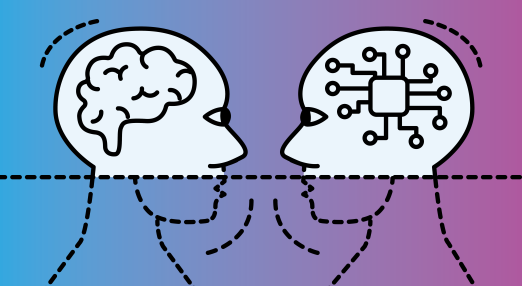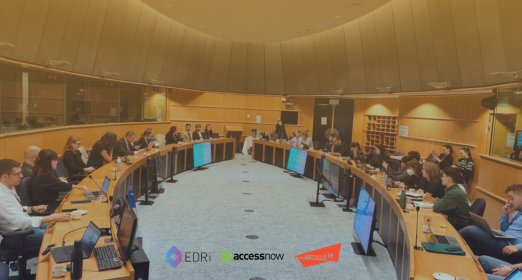A new tool helps Slovenian public identify AI-generated content and educates about its risks
EDRi affiliate Danes je nov dan recently launched Razkrinkaj.ai – an online tool that allows users to test their ability to recognise AI-generated content through an interactive quiz while learning about the risks and challenges associated with it.
Filter resources
-

A new tool helps Slovenian public identify AI-generated content and educates about its risks
EDRi affiliate Danes je nov dan recently launched Razkrinkaj.ai – an online tool that allows users to test their ability to recognise AI-generated content through an interactive quiz while learning about the risks and challenges associated with it.
Read more
-

European Commission guidelines on the AI Act implementation must center human rights and justice
Over 25 civil society organisations and experts actively following the implementation of the Artificial Intelligence (AI) Act are urging the European Commission’s AI Office to ensure that the upcoming Commission guidelines clarify fundamental rights as the central guiding basis to enable meaningful AI Act enforcement. They also note note the various shortcomings of the Commission’s consultation process.
Read more
-

New European Commission confirmed: our takeaways on what to expect
On 1 December 2024, the new political leaders of one of the EU’s most powerful institutions – the European Commission – officially took office. As part of their nomination process, they shared their digital visions for the next five years. Spoiler alert: the fight for digital rights will be as important as ever, with data protection, encryption and privacy all on the chopping block.
Read more
-

A new registry empowers the Slovenian public to monitor the use of AI systems by public institutions
EDRi affiliate Danes je nov dan recently launched their Public Sector AI Registry. The platform provides insight into the use of AI systems by Slovenia’s public institutions and highlights the lack of transparency from officials.
Read more
-

German federal health minister, Shein and Deutsche Bahn ‘awarded’ for worst privacy and data protection offences
In October 2024, EDRi member Digitalcourage held the annual gala for the German BigBrother Awards. The unfortunate “winners” included a minister in the federal government, the police and interior minister in one German state, two international online retailers, a fundamental infrastructure provider and a trend.
Read more
-

EDRi and members take EU decision-makers through 20 years of digital policy
This September, EDRi, Access Now and ARTICLE 19 took Parliamentarians through a rollercoaster ride of all things digital policy in the European Union. From the early internet and initial experiments in platform regulation, through more recent regulatory innovations, and finally to questions of security and surveillance, we shared a digital rights perspective of the good, the bad and the ugly of digital policy in the EU.
Read more
-

Biometric surveillance in the Czech Republic: the Ministry of the Interior is trying to circumvent the Artificial Intelligence Act
EDRi-member Iuridicum Remedium draws attention to the way biometric surveillance at airports should be legalised in the Czech Republic. According to the proposal, virtually anyone could become a person under surveillance. Moreover, surveillance could be extended from airports to other public spaces.
Read more
-

Statement: EU takes modest step as AI law comes into effect
The EU Artificial Intelligence (AI) Act will finally come into force on August 1, 2024. While it's disappointing that the final law did not put people and their rights at the centre, it still contains some silver linings.
Read more
-

New report unravels AI narratives in sci-fi cinema and TV
Students of the SWPS University’s Institute of Humanities in Warsaw, Poland, published their research on “Visions of AI in Popular Culture: Analysis of the Narratives about Artificial Intelligence in Science Fiction Films and Series”. The report delves into the central themes and recurring motifs through which technology becomes ingrained and socialised in cinematic fiction.
Read more
-

EDRi and Reclaim Your Face campaign recognised as Europe AI Policy leaders
EDRi and the Reclaim Your Face coalition were recognised as the Europe AI Policy Leader in Civil Society for our groundbreaking work as a coalition to advocate for a world free from biometric mass surveillance.
Read more
-

How to fight Biometric Mass Surveillance after the AI Act: A legal and practical guide
The EU's Artificial Intelligence Act has been adopted, laying out an in-principle ban on live mass facial recognition and other public biometric surveillance by police. Yet the wide exceptions to this ban may pave the way to legitimise the use of these systems. This living guide, for civil society organisations, communities and activists, charts a human rights-based approach for how to keep resisting biometric mass surveillance practices now and in the future
Read more
-

Packed with loopholes: Why the AI Act fails to protect civic space and the rule of law
The European Parliament approved the AI Act on 13 March 2024, thus marking the end of a three-year-long legislative process. Yet to come are guidelines and delegated acts to clarify the often vague requirements. In this article, ECNL takes stock of the extent to which fundamental rights, civic space and the rule of law will be safeguarded and provide an analysis of key AI Act provisions.
Read more
